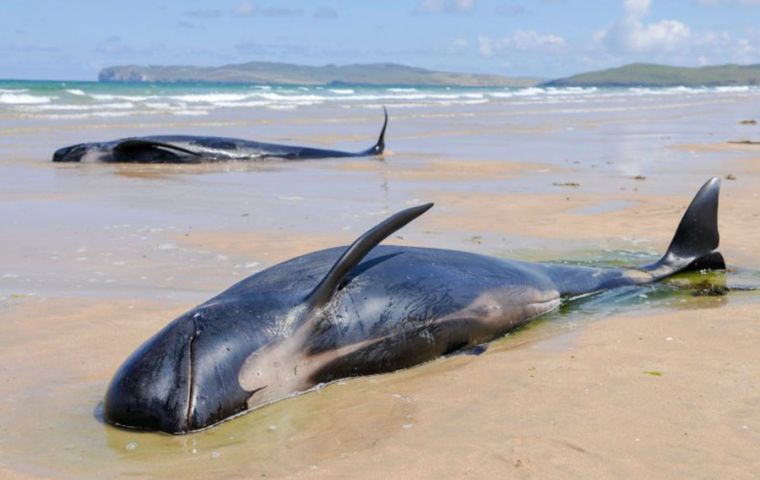MercoPress. South Atlantic News Agency
New theory on mass strandings among pilot whales, includes Falklands' experience
 At sea cetaceans form family pods, which include multiple generations of pilot whales all related to a single female
At sea cetaceans form family pods, which include multiple generations of pilot whales all related to a single female Mass stranding events among cetaceans – a group of marine mammals including the whale, dolphin, and porpoise – have been reported since the times of Aristotle and there has been a long drive to understand what causes them. Long-finned pilot whales – a gregarious species with complex social bonds – are those most often affected.
Recent genetic analysis in both the northern and southern hemisphere, in the Falkland Islands, by a team including academics from Aberystwyth University challenges existing thinking as to the role of social behaviors in mass strandings of these animals.
At sea they form family units known as pods. Within a pod there are multiple generations of pilot whales that are all related to a single female. It has therefore long been thought that mass strandings may be caused by family members trying to stay together.
However, the data reveals that in most cases each mass stranding involved multiple unrelated pods, rather than a single pod as was previously thought. This suggests that family disruption, rather than family cohesion, may be a major cause of these events.
The new research has implications for how rescues are attempted: assuming all the animals stranded were related may have compromised previous efforts, as intentionally refloating unrelated animals may contribute to re-strandings.
One of the research team, Dr Niall McKeown, a lecturer in Marine Biology at Aberystwyth University, said: “The assembled team has collaborated to obtain and genetically analyze samples from mass stranding events for the first time in the north east Atlantic and the Falkland Islands. The findings provide further evidence that there may be mixing of family units at some stage during stranding processes. It remains to be seen to what extent this is a cause, or a consequence of mass strandings.”
As well as academics from Aberystwyth University, the project also includes researchers from the Falkland Islands Fisheries Department, Universities of Glasgow, Chester, Utrecht, the Galway-Mayo Institute of Technology and the Scottish Marine Animal Stranding Scheme.
Dr McKeown added: “Our study shows mixed family groups within a mass stranding event. It may also reflect a more complex social society than assumed of long-finned pilot whales. Further research will help to disentangle such factors and be of great relevance to rescue strategies.”




Top Comments
Disclaimer & comment rulesCommenting for this story is now closed.
If you have a Facebook account, become a fan and comment on our Facebook Page!